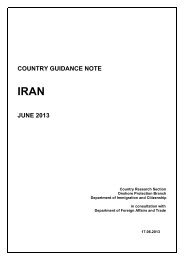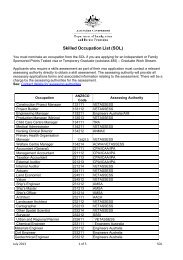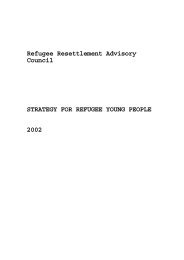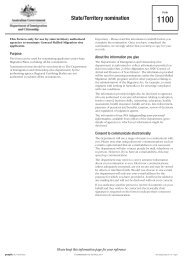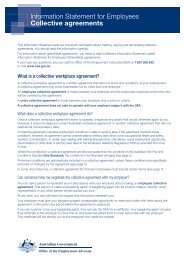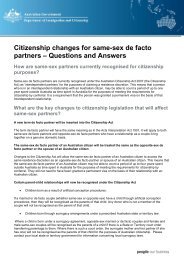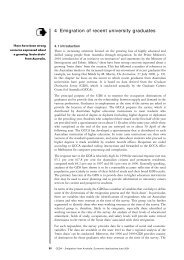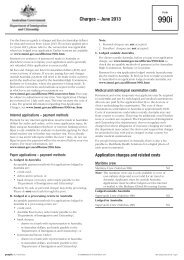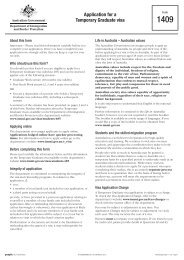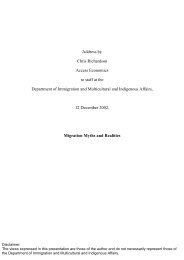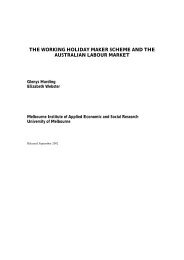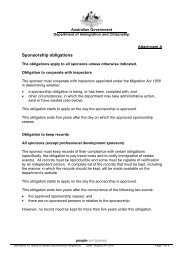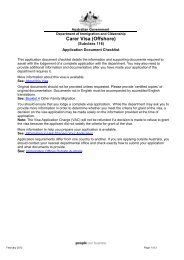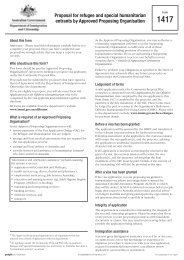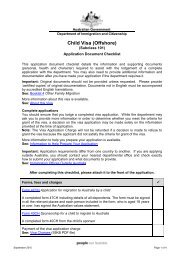Evaluation of the Integrated Humanitarian Settlement Strategy (IHSS)
Evaluation of the Integrated Humanitarian Settlement Strategy (IHSS)
Evaluation of the Integrated Humanitarian Settlement Strategy (IHSS)
Create successful ePaper yourself
Turn your PDF publications into a flip-book with our unique Google optimized e-Paper software.
a range <strong>of</strong> medical illnesses prior to travel and entrants undertake to have follow up treatment if<br />
required on arrival in Australia. However, not all entrants do this. If an entrant elects to defer or not to<br />
have a health screening/assessment through <strong>the</strong> EHAI service and if <strong>the</strong>y do have health problems,<br />
failure to provide a prompt physical health examination may not be in <strong>the</strong>ir best interests or those <strong>of</strong><br />
<strong>the</strong> broader Australian community.<br />
Recommendation 14<br />
Medical Information Requirements<br />
DIMIA needs to ensure that information on medical examinations conducted overseas (and any<br />
undertakings made) is provided to <strong>the</strong> most appropriate <strong>IHSS</strong> service before or upon <strong>the</strong> entrant’s<br />
arrival in Australia and that <strong>the</strong> <strong>IHSS</strong> facilitates any follow up action.<br />
Application <strong>of</strong> <strong>the</strong> EHAI model<br />
The way that <strong>the</strong> EHAI service is currently designed reflects <strong>the</strong> <strong>IHSS</strong> principle <strong>of</strong> client choice and<br />
entrants only receive a health screening/assessment if <strong>the</strong>y elect to have one after having received<br />
information from <strong>the</strong> EHAI provider. EHAI providers report that about 60% <strong>of</strong> entrants provided with<br />
information elect to have a health screening/assessment and <strong>the</strong> o<strong>the</strong>rs ei<strong>the</strong>r do not take up this<br />
opportunity or defer it until o<strong>the</strong>r needs such as housing and employment are resolved. Given <strong>the</strong><br />
data on <strong>the</strong> high health support needs <strong>of</strong> this group, 60% flow on for physical health support is <strong>of</strong><br />
concern. Health conditions left untreated for some time may worsen considerably and undermine <strong>the</strong><br />
ability <strong>of</strong> <strong>the</strong> entrant to rebuild <strong>the</strong>ir life in Australia. The evaluation found that <strong>the</strong>re is a gap in <strong>the</strong> way<br />
that <strong>the</strong> model is designed in relation to addressing <strong>the</strong> early health needs <strong>of</strong> entrants. The IIOA<br />
provider is contracted to link entrants to emergency medical assistance if needed in <strong>the</strong> initial 24<br />
hours after arrival and <strong>the</strong> EHAI contract allows <strong>the</strong> provider up to two weeks after referral to contact<br />
<strong>the</strong> entrant with information and assistance on health services available. In <strong>the</strong> interim period,<br />
entrants can have urgent medical needs and at present <strong>the</strong> model does not clearly identify any<br />
provider with responsibility for addressing <strong>the</strong>se needs.<br />
This gap in <strong>the</strong> design <strong>of</strong> <strong>the</strong> model needs to be addressed as soon as possible to overcome <strong>the</strong><br />
current situation in which IIOA providers can be required to deliver support beyond <strong>the</strong>ir contract<br />
responsibilities, and entrants may experience considerable anxiety shortly after arriving in Australia<br />
having to navigate <strong>the</strong>ir way through a medical system with no support.<br />
As stated above, 80% <strong>of</strong> <strong>the</strong> clients screened for health issues by EHAI providers require referral to a<br />
GP who <strong>the</strong>n conducts a physical health examination and refers to any specialist health services as<br />
required. There is <strong>the</strong> issue <strong>of</strong> whe<strong>the</strong>r it is necessary to have <strong>the</strong> EHAI model involve a physical<br />
health screening leading to referral to a GP for a physical health examination if <strong>the</strong> process could be<br />
done earlier by <strong>the</strong> <strong>IHSS</strong> service <strong>of</strong>fering a client linkage to a GP on arrival.<br />
It would be more efficient and useful to <strong>of</strong>fer all entrants, on arrival, <strong>the</strong> options <strong>of</strong> a referral to a GP or<br />
health clinic which can <strong>of</strong>fer a full physical examination and referral to specialist services as required<br />
ra<strong>the</strong>r than having an initial screening by an intermediate agency. Clearly <strong>the</strong>re would still be an<br />
ongoing need for training/consultancy advice to GPs and o<strong>the</strong>r health pr<strong>of</strong>essionals working with this<br />
client group.<br />
49<br />
<strong>Evaluation</strong> <strong>of</strong> <strong>the</strong> <strong>Integrated</strong> <strong>Humanitarian</strong> <strong>Settlement</strong> <strong>Strategy</strong> 27 May 2003



